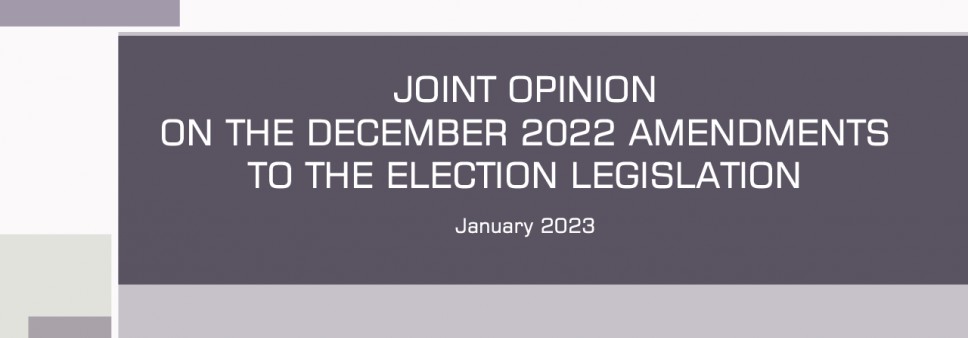JOINT OPINION ON THE DECEMBER 2022 AMENDMENTS TO THE ELECTION LEGISLATION
In March 2022, Georgia submitted an official application for EU membership. In June, the European Council requested that the Georgian government comply with 12 conditions of the European Commission to receive a candidate status for membership. One of the conditions related to election issues stated that Georgia should address all shortcomings identified by OSCE/ODIHR and the Council of Europe/Venice Commission.
To fulfill this recommendation, the Parliament of Georgia established a working group. However, some parliamentary groups did not participate in the working group. Moreover, the parliamentary majority artificially limited the involvement of civil society organizations.
In October 2022, with the first hearing, the Parliament of Georgia adopted the legislative amendments, authored by the working group and initiated by the Legal Issues Committee. The draft laws included the amendments to the Election Code and the Law on Political Associations of Citizens. On October 10, the Chair of the Parliament forwarded the draft laws to the Venice Commission and OSCE/ODIHR and requested an expedited opinion on them.
On December 19, the Venice Commission and OSCE/ODIHR published their opinion on the submitted draft laws. Based on these recommendations, the Parliament made some changes to the draft laws, which were finally adopted with the third hearing on December 22.
According to the joint assessment of ISFED, TI Georgia, and GYLA, the adopted legislative changes respond to some problems identified by local civil society organizations and the Venice Commission and OSCE/ODIHR. This should be assessed positively. However, these changes did not fully consider all the essential recommendations, including some of the suggestions that the Venice Commission and OSCE/ODIHR presented in December 2022. According to their joint opinion of these institutions, the implemented reform is not based on a comprehensive review of the Election Code and only addresses a selection of issues.
With certain reservations, the following amendments should be positively assessed:
- The introduction of mandatory certification for PEC members;
- The extension of some deadlines for submission and review of complaints/lawsuits;
- The introduction of voter inking in the process of voting with a mobile box;
- Halving a ceiling on the annual expenses of political parties;
- The reduction of residence term for candidates in local elections;
- Increasing the amount of the fine imposed for the abuse of administrative resources;
- Expanding the grounds of incompatibility of positions of PEC members elected on professional grounds;
- The introduction of an obligation to open documentation and recount votes in case of imbalances in summary results protocols.
In addition, the introduction of modern technologies in the electoral process is generally welcome. However, it is essential that the regulations on this issue be more precise and comprehensive and that as few issues as possible be left to the discretion of the CEC.
Among the key recommendations of the Venice Commission and OSCE/ODIHR, which were not reflected in the adopted amendments, the following are worth noting:
- The flawed regulations for electing CEC chair and professional members and the extension of the authority of existing ones;
- The possibility of leaving political parties without public funding unfairly and against international standards.
In addition, repeated recommendations related to the election of professional members at the lower level of election commissions and to the transparency of this process were left unconsidered. In their joint opinion, the Venice Commission and OSCE/ODIHR also emphasized that the submitted draft law failed to respond to critical challenges such as the abuse of administrative resources, voter intimidation, insufficient criteria for recounting votes, and invalidating results.
According to the Venice Commission and OSCE/ODIHR opinion, comprehensive and inclusive electoral reform should be carried out in the future, which will be based on a complete and in-depth analysis of the problems in electoral legislation and practice. During the election reform, the opinions of the Venice Commission and OSCE/ODIHR written on separate draft laws, as well as the recommendations presented by the election observation missions at different times, should be taken into account as much as possible.
CLICK HERE TO OPEN THE DOCUMENT IN A NEW WINDOW AND DOWNLOAD IT

